This month we warmly welcome four new poets to the streetscape and celebrate our first Australia Council publishing grant. Not quite sure how to describe all this spring growth: is it surprising, disturbing, turbulent or just, er, acromegalic?
Jenny Blackford won the university medal in Classics at the University of Newcastle, branching naturally enough to a career in computer networking in Melbourne. These days she is back in Newcastle and writing full time. Her short stories are published widely: by Random House, Cosmos magazine and in anthologies such as HarperCollins Voyager Dreaming Again. An historical novel The Priestess and the Slave (Hadley Rille) appeared in 2009. Her poems are in Westerly, The Pedestal Magazine, Midnight Echo, Star*Line, Eternal Haunted Summer, Dreams and Nightmares and Dolly (!) and are forthcoming in Strange Horizons and Quadrant. She is a regular contributor to that venerable and much loved institution the NSW School Magazine.
Devoted students of Pitt Street Poetry’s publishing history may fondly recall Etruscan Miniatures, an illustrated pamphlet recounting a decadent Italian summer holiday by London-based poet Tim Cumming. The moderate international success of this little booklet has led us to plan a few more in the same format. So we are really delighted to announce a suite of 12 poems by Jenny Blackford entitled The Duties of a Cat with feline images by Kirribilli artist Michael Robson. We know full well, of course, that there is absolutely no precedent for collections of poems about cats. Meow.
The name Benedict Andrews guarantees audiences a compelling and often disturbing night in the theatre. His eight-hour conflation of Shakespeare’s history plays The War of the Roses for Sydney Theatre Company with Cate Blanchett as Richard II. His reframing of Mozart’s Le Nozze de Figaro for Opera Australia within bleak institutional walls. And most recently his mesmerising reading of Jean Genet’s The Maids, again for STC. To these should be added inter alia critically acclaimed productions of Chekhov on the West End, Monteverdi for ENO, Macbeth and King Lear in Reykjavik and Tennessee Williams in Berlin. Not bad for an Adelaide boy.
The peripatetic life of an international theatre director offers plenty of down time a long way from home. Benedict Andrews devotes this more often than not to his poetry, which has been unpublished up until now. Poems about the theatre, about his new home in Iceland and, inevitably, a long suite of louche meditations on hotel rooms. You will find his first collection Lens Flare a memorable read.
Eileen Chong grew up in Singapore speaking English, Hokkien and Mandarin, and studied English language and literature at the NUS. Amorous adventure brought her recently to Sydney where she has studied poetry with Judith Beveridge at the University of Sydney and with Ivor Indyk at the University of Western Sydney. She has been published in Meanjin, Australian Book Review, Softblow, and the Sun-Herald and is a regular contributor to the Red Room Company’s poetry programs. A fellowship with Australian Poetry introduced the mentorship of Anthony Lawrence and the publication of a compact collection of 40 poems which sold out rapidly across Australia and South East Asia.
So when Burning Rice was nominated for the 2013 Prime Minister’s Literary Award for Poetry, to our great good fortune Eileen Chong turned to us for a quick reissue of a reformatted second edition, which was delivered to bookstores a few short weeks ago. These poems operate at the complex nexus between Chinese and Australian culture. Personal questions concerning life, love and family are explored in a knowing, chuckling transcultural context not only in contemporary Sydney but also in the medieval Chinese court. Eileen Chong’s second collection Peony will be forthcoming from Pitt Street Poetry in 2014.
And so to our fourth and final welcome: to Mark Tredinnick. Precious few of those who read these lines will not have already read many more of his. Take a moment to savour Mark’s inimitable, circumlocutory take on the nature of things with his current series of blog posts for Southerly.
The story of his late move from the law, management consulting, and publishing at Butterworths and Allen & Unwin to working full time as a poet, erstwhile sage, teacher of fine writing and habitué of literary festivals here there and everywhere is too well known to bear repeating here. Not to mention the ensuing string of national and international successes, with prizes for individual poems in Newcastle, Cardiff and Montreal. It goes equally without saying that we are absolutely stoked that Mark Tredinnick is joining the Pitt Street Poetry stable of poets, and that we can announce for the first time here the publication of his new book Bluewren Cantos as part of a trilogy of poetry collections to appear over the next twelve months. So welcome to Pitt Street, Mark, we are looking forward to the ride.
* * *
With all this growth then, perhaps it’s just as well that the gods of the Literature Board have smiled upon us with the award of a publishing grant for the 2013-2014 period. Warmest thanks to all the members of the board, to the Australia Council for the Arts and to our poetry-loving Arts Minister Tony Burke for this essential and unexpected recognition and support.

